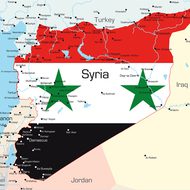by Jonathan Granoff
published in the Huffington Post
We can hear the drum beats of war again. Syria certainly appears to have committed heinous acts. The rebels may also have done so as well. Chemical weapons have not been the only horrific means of injuring innocent people. Tens of thousands have died and millions of lives have been disrupted. The use of chemical weapons against innocent civilians crosses a red line and violates international values, law, and stability. It cannot go unanswered.
Responses to wrongdoing must not exacerbate problems. The UN inspectors are not tasked with discerning the origin of the chemical weapons attacks and thus more proof will be needed to give the use of force any legitimacy. After the Iraq intelligence fiasco the U.S. has a credibility deficit in the international community. Real credibility is one element of legitimacy. Law must also not be ignored, certainly not by a country that founds its very existence on the rule of law.
Law prima facie gives legitimacy to political action. Without it the entire edifice of peace is placed at risk even when the moral outrage of the public is calling for action. Presently, without Security Council authorization, coercive military intervention in Syria would not be legal. Since the fighting in Syria is not threatening another country the circumstance of self-defense, which would allow the immediate use of force against Syria by the threatened country without approval of the Security Council, is not applicable. The actions of the Assad regime are horrible. Still, international law should not be set aside with impunity.
Are we left with no alternative routes? Certainly not. There would be a different political dynamic if the International Criminal Court (ICC) were to determine that sufficient evidence for a prosecution exists. If it decided that crimes against humanity had been committed, the entire political landscape would change.
Mass atrocities are not new for the Assad regime. The United Nations Human Rights Commissioner Navi Pillay as far back as December of 2011 called for the ICC to investigate mass killings. She was correct then. It is worth noting that she has recently called for ICC investigations of rebel slaughters as well.
There is firm legal foundations for ICC involvement. Although Syria is not a party to the 1993 Chemical Weapons Convention, prohibiting the use of chemical weapons, that does not matter. Customary international law prohibits the use of such weapons of indiscriminate effect generally and Syria would be responsible, especially if they were used against civilian populations regardless of whether they are party to the Treaty. The use of chemical weapons is a war crime within the terms of the Statute of the International Criminal Court (ICC) only if they are used in an international armed conflict, which the conflict in Syria is not. But, their use is illegal as a war crime if intentionally directed against a civilian population in a non-international armed conflict. Such a crime can be prosecuted by the ICC.
Although Syria is not a member of the ICC, that also does not matter. For the Court to formally investigate allegations of criminal conduct, such as mass indiscriminate killings or the use of chemical weapons, the Security Council could refer Syria, or the rebels, or both, to the Court. References by the Security Council to the court have been done in the recent past — Darfur in 2005 and Libya in 2011. Even threatening such actions could have a beneficial impact.
The legal hurdles to such a reasonable course of action are not as high as the political ones. However, advancing world security through the rule of law will provide much greater benefit than such short term political posturing that does little to stop the brutality the people of Syria are experiencing.
One problem of a referral to the Court is that if it commences a prosecution it might make the horse-trading negotiations between the various rebel groups and the Assad regime difficult. If either faces prosecution in the event of losing militarily it could diminish incentives to achieve peace. The status quo is worse than this risk. It is certainly preferable to risking very dangerous unintended consequences of an illegal military strike now.
Jonathan Granoff is the President of the Global Security Institute, a representative to United Nations of the World Summits of Nobel Peace Laureates, a former Adjunct Professor of International Law at Widener University School of Law, and Senior Advisor to the Committee on National Security American Bar Association International Law Section.








